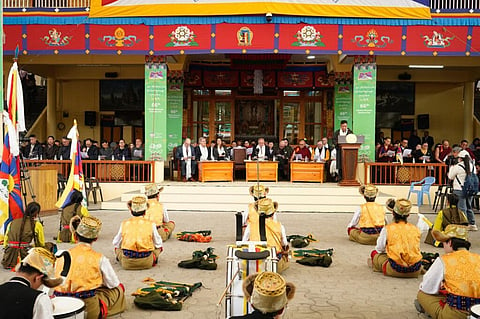

CHANDIGARH: The Tibetan government-in-exile, also known as Kashag, has reinforced its pledge to the Dalai Lama's middle-way approach concerning the ongoing China-Tibet conflict. This strategy emphasises resolving the issue through non-violent means and dialogue.
In an official statement released on the 66th anniversary of the Tibetan National Uprising Day, Kashag highlighted the Chinese government's strategy to erase Tibetan identity under the guise of promoting national unity and condemned the extensive policies of sinicisation that threaten Tibetan heritage and rights.
"As envisioned by His Holiness, Tibetan people remain committed to the path of non-violence and dialogue in finding a lasting and mutually beneficial solution to resolve the Sino-Tibet Conflict through Middle Way Approach," the statement read.
"It also reaffirms our confidence that the Tibetan people the rightful custodians of the Tibetan plateau since its formation embody unique religious and cultural traditions that cannot be erased, an indomitable spirit that cannot be broken, and an unparalleled leadership of His Holiness the Dalai Lama that cannot be replaced," it added.
Looking forward, the Kashag will focus on the 'Year of Compassion', honouring the Dalai Lama's leadership and promoting human values, global religious harmony, and Tibetan culture. The statement also underscored efforts to revive ancient Indian wisdom, impacting scientific discussions and SEE (Social, Emotional, and Ethical) learning across over 170 countries.
It added "nurtured by the far-sighted vision and unwavering compassion of the Dalai Lama, we have not harboured hatred or animosity toward the Chinese Communist government that has occupied our homeland and caused the untimely death of more than 1.2 million Tibetans and destruction of over six thousand monasteries."
Dwelling on the Dalai Lama's fourth mission, it read that he believes that Tibetans, who have safeguarded and practised this knowledge for generations, can contribute to this revival as an act of gratitude towards India.
Tibetan language has preserved extensive collections of ancient Indian knowledge, both in quantity and quality that is unmatched in any other language, and about 5,000 Indian classical texts including on grammar, Tibetan medicine, arts, Buddhist logic, and Buddhist philosophy.
The statement added that five minor sciences poetry, performing arts, lexicography, composition, and mathematics and astrology have been translated into Tibetan due to dedicated efforts by Indian and Tibetan scholars and translators over centuries, the statement highlighted.
The statement said that on this date 66 years ago, Tibetans from all three provinces unitedly rose up against the "illegal occupation of Tibet and China's brutal inhumane policies and practices in Tibet."
"Under the violent suppression of Chinese forces, over a million Tibetans lost their precious lives and compelled the legitimate Tibetan government led by His Holiness the Great 14th Dalai Lama, followed by approximately 80,000 Tibetans into exile. This marks the darkest and most critical period in the history of Tibet," it read.